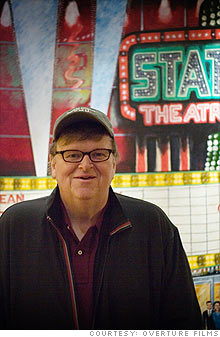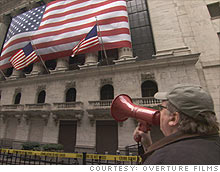Michael Moore takes on capitalism
In his new film, the director of "Fahrenheit 9/11" delivers a provocative, ambitious look at the financial crisis.
 |
| Michael Moore, director, "Capitalism: A Love Story" |
 |
| Moore outside the New York Stock Exchange, trademark megaphone in hand |
VENICE (Fortune) -- If anyone has profited from the free-enterprise system in the past 20 years, it's Michael Moore. Since 1989, when his "Roger & Me" pioneered the docu-comedy form of nonfiction film, Moore's movies, TV shows and best-selling books have given him an eight-figure net worth.
And in all of these, he is the improbable star: a heavyset fellow with a doofus grin, alternately laughing and badgering but always at the center of his own attention. Why, there he is, at the end of his new movie, "Capitalism: A Love Story," wrapping the New York Stock Exchange building in yellow tape that reads: CRIME SCENE.
The writer-director-propagandist has earned every penny and Euro of his boodle. Moore's last three filmed diatribes -- "Bowling for Columbine," "Fahrenheit 9/11" and "Sicko" --h ave amassed more than $300 million in theaters worldwide, and loads more on DVD; and "Fahrenheit" is, by a long stretch, the top-grossing documentary of all time.
Now, there's no reason a popular entertainer, even one whose subjects are the gun lobby, the march to war in Iraq and the health-care industry, should live like a monk. It's just a little ironic that the man who made his career attacking corporate America should be a pretty big business himself.
Moore is doing well abroad; his last three films have made nearly half their total income in foreign countries. So it's fitting "Capitalism: A Love Story" had its world premiere Sunday at the Venice Film Festival. This follows the Cannes debuts, with headline-making, mostly rapturous receptions, of "Columbine," "Fahrenheit" and "Sicko."
Why does has working-class guy from Flint, Mich., won the hearts of Europeans? Perhaps because his movies indulge the continental view of America: that we're gun-crazy, we invade countries that haven't attacked us and we think medical coverage is a profit-making scam, not a citizen's basic right. Europe is a peaceful civilization that knows its place and cares for its people. We're armed, dangerous and stupid.
That's not quite Moore's view. He has a dewy respect for the underclass; each of his films has testimony from working men and women who burst into tears or soar into rage describing injustices done them. To Moore, it's the bureaucratic-industrial complex -- the combined might of the West Wing, Wall street and Wal-Mart -- that's evil.
That view was never clearer than in his broadly entertaining, ceaselessly provocative, wildly ambitious new film. Not satisfied with outlining and condemning the housing and banking crises of the past year, it expands the story of the financial collapse into an epic of malfeasance: capital crimes on a national scale.
Home are foreclosed on people who could meet their old mortgage payments but not the new, ballooned ones. (One family does get $1,000 for cleaning out the house they've just been evicted from.) Corporations take out policies on their workers, then pocket tax-free "dead peasants" insurance by the carload while the victims' families get nothing. Two judges in Pennsylvania close down a state detention center, then sentence children to long terms in a private facility that kicks back millions to the judges.
By now, a Michael Moore film is its own genre: a vigorous vaudeville of working-class sob stories, snippets of right-wing power players saying ugly things, longer interviews with experts on the Left, funny old film clips and, at the climax, Moore engaging in some form of populist grandstanding.
This time, he goes to the headquarters of the former AIG, a multibillion-dollar recipient of government largesse, and attempts to make a citizen's arrest of its chief executives. He also asks Wall Streeters for advice on healing the nation. One man's quick reply: "Don't make any more movies."
"Capitalism" has lots of statistics, like the Rasmussen poll that showed only a slight majority of young adults prefer capitalism to socialism. But this is a lecture from a charismatic comedian of a professor; he makes his points with gag movie references and quick visual puns.
In "Capitalism," when the narrator of a 1950s instructional film about ancient Rome's use of gladiatorial games "to keep the idle citizens entertained," he tosses in a shot from American Idol. (Idle, Idol.) Running a clip from the 1977 "Jesus of Nazareth," Moore puts new words in the Messiah's mouth so that Jesus now tells a supplicant, "I am sorry, I cannot heal your preexisting condition."
Look, if you want fair and balanced, go to Fox News. But Moore does give a little time to those on the other side. As a carpenter hammers pasteboard over the facade of a foreclosed home, he observes, "If people pay their bills, they don't get thrown out." Wall Street Journal editorial board member Stephen Moore gets about a minute to explain why capitalism is great and democracy isn't.
Sometimes Moore lavishes attention on adversaries just because they're so much fun. Peter Zalewski, founder of Condo Vultures, which buys up defaulted homes on the quick and cheap, tells the filmmaker, "What's the difference between me and a real vulture? I say that's simple: I don't vomit on myself."
Toward the end, Moore shows the jubilation in Chicago's Grant Park the night Barack Obama was voted President. Two days before that election, Moore said of Obama, "The Republicans aren't kidding when they say he's the 'most liberal' member of the Senate. ... He is our best possible chance to step back from the edge of the cliff."
Since Jan. 20, a part of the right may be calling Obama a Communist, but not many liberals are calling him liberal. The movie seems to be setting up the disappointment many on the Left have felt over the awarding of more billions to giant banks and corporations, among other things, since Jan. 20. And Moore does note that Goldman Sachs gave more than $1 million to Obama's campaign.
But he doesn't go after this Democratic President as he surely would have if John McCain had been elected. Instead, he argues for participatory democracy: do-it-yourself do-gooding, through community activism and union organizing. That's an optimistic and evasive answer to the financial problem.
Surely what spun out of control because of government indulgence and indolence needs to be repaired by government regulation and ingenuity. Squatting in your repossessed home won't get the trillions back. In "Capitalism: A Love Story," Moore has cogently and passionately diagnosed the disease. But for a cure, instead of emergency surgery, he prescribes Happy Meals.
--Richard Corliss, a senior writer for TIME, is the magazine's film critic. ![]()
-
 The retail giant tops the Fortune 500 for the second year in a row. Who else made the list? More
The retail giant tops the Fortune 500 for the second year in a row. Who else made the list? More -
 This group of companies is all about social networking to connect with their customers. More
This group of companies is all about social networking to connect with their customers. More -
 The fight over the cholesterol medication is keeping a generic version from hitting the market. More
The fight over the cholesterol medication is keeping a generic version from hitting the market. More -
 Bin Laden may be dead, but the terrorist group he led doesn't need his money. More
Bin Laden may be dead, but the terrorist group he led doesn't need his money. More -
 U.S. real estate might be a mess, but in other parts of the world, home prices are jumping. More
U.S. real estate might be a mess, but in other parts of the world, home prices are jumping. More -
 Libya's output is a fraction of global production, but it's crucial to the nation's economy. More
Libya's output is a fraction of global production, but it's crucial to the nation's economy. More -
 Once rates start to rise, things could get ugly fast for our neighbors to the north. More
Once rates start to rise, things could get ugly fast for our neighbors to the north. More








